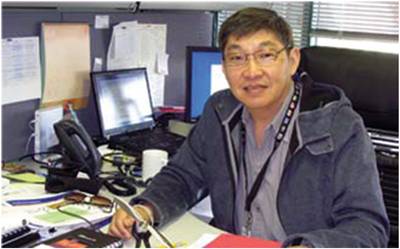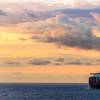Dr. Henry Chen Chief Naval Architect, Jeppesen
Profile of a 2012 Fleet Optimization Conference Speaker
The term “Fleet Optimization” means many things to many people. What does it mean to you?
Dr. Chen Fleet Optimization encompasses many aspects of shipping operations ranging from finding the best deployments and schedules for maximizing the fleet revenue/profit to minimizing total fuel consumption on a particular passage given the loading conditions and forecast weather to arrive on-time. Historically, such decisions are derived from years of experiences with hit or miss results. The current market and regulatory conditions have introduced added complexity that if not well-managed they could result in costly mistakes. Decision support systems are therefore needed to find the best solution while satisfying these constraints. This conference is very timely as the industry is facing such challenges and looking for solutions.
You have elected to speak at the inaugural Shipping Insight Fleet Optimization Conference in Stamford in October: If you could boil it down into a paragraph, what will be the thrust of your message?
Dr. Chen The thrust of my message will be to show how such decision support systems for voyage optimization and safety have been proven over the years and how they are being increasing deployed by progressive shipping companies to manage risks and minimize fuel cost. Utilizing the advances in numerical weather/current forecast, ship performance modeling/simulation, high speed satellite communication and powerful desk top computers, voyage optimization has superseded traditional “hit or miss” weather routing methods.
Vessel owners of every size are faced with legislated challenges in terms of emissions, fuel quality and the standard array of new equipment rules, such as ballast water treatment systems. I know the solutions vary greatly by vessel type and area of operation, but in your opinion, regardless of geographic locale or type of vessel in their fleet, what could/should every vessel owner be doing today to optimize the efficiency of their fleet.
Dr. Chen Regulatory challenges will only increase in the future. Owners should invest in strategic efficiency management planning, training, and decision support systems to help ship’s crew to understand the consequences of their actions in dollars and cents. Unbiased, quantitative procedures (for example, benchmark processes with valid KPIs) will reward the good performers while helping the rest to improve.
Much is read and said regarding emerging rules regarding fuel, emissions and the environment and their impact on vessels and the companies that own them. Can you put in perspective for our readers the changes we are seeing today, putting them in context with changes you have seen?
Dr. Chen Looking back over the past 30 years, the shipping industry has always been reactive to major accidents: Double-hulls after Exxon Valdez, VDRs after the Erica accident, ECAs in response to port states, GHG from green initiatives of cargo owners, ballast water treatment from marine biologists; EEDI to satisfy the environmentalists. Since the regulations often were crafted by people who do not have in-depth shipping knowledge, the operators are faced with high cost and unsafe solutions to satisfy the rules. We need to be PROACTIVE and anticipate the future requirements in building new ships. One such example is EEOI.
While it is not currently mandated, it will be a lot more cost effective to fit necessary sensors and monitoring systems in a new-build than to add the capability after ships are in service. Taking a systems approach will also enable multi-purpose use of equipment (e.g. using the same VDR for both SOLAS and SEEMP/EEOI requirements) thereby reducing life cycle costs and training effort.
Dr. Henry Chen
Dr. Henry Chen is currently the Chief Naval Architect for Denver, CO-based Jeppesen. Jeppesen is a Boeing Company that specializes in providing navigation and optimization solutions to the aviation, marine and land transportation industries. Dr. Chen has 37 years of experience working for the maritime and offshore industries. He was previously the founder of Ocean Systems Inc. and developed the Voyage Optimization and Safety system based on his Ph.D. thesis at MIT. The company was acquired by Boeing in 2008 and merged into Jeppesen. He received B.Sc. in Naval architecture from University of Newcastle Upon Tyne, Master degrees in Shipping Management, Ocean Engineering and Ph.D. in Ship Systems from MIT.
October 8-10, 2012, Stamford, CT
http://www.shippinginsight.com
Program at a Glance
The 2012 Fleet Optimization Conference, organized by Shipping Insight, and assisted by the publishers of Maritime Reporter & Engineering News, have effectively worked to assemble a “who’s who” list of speakers and panelists. Speakers and panelists will include senior executives from across the shipping industry spectrum. Below is a partial list. For full details, visit
www.shippinginsight.com
Monday, October 8
6:00 PM Reception and Networking Event
Tuesday, October 9
Shipping Market Outlook 2013
Steven Gordon, Clarksons
Environmental Regulations Overview
Jeanne Grasso, Partner, Blank Rome LLP
Ship Design: Session 1 – Efficiency
Moderator: Capt. Rene Menzel, Managing Director, Peter Dohle/Hammonia Reederei
Speakers
Spencer Schilling, Herbert Engineering Corp
Bill Lind, Director, ABS Americas
Elisabeth Tørstad, DNV
Leo Schellmann, Wärtsilä
Ship Operations:
Session 2 – Fuel Management
Moderator:
Capt. Ulf Svedberg, Master Mariner,
Swedish Maritime Association
Speakers
Uwe Bullwinkel, Germanischer Lloyd USA
Mark Kester, Emerson
Ship Operations: Session 3 –
Ship Performance/Voyage Optimization
Moderator
Ulf Samuelson, Royal Caribbean International
Speakers
Henry Chen, Jeppesen
Paul Welling, Transas
Jan Hansen, NG Sperry Marine
6:00 PM Networking Event
Wednesday, October 10
Ship Operations: Session 4 – Hull Performance
Moderator:
Capt. Ulf Samuelson,Royal Caribbean International
Speakers
Jim Brown, International Paint
Frank Christophersen, Raytheon
Session 5 – Technology
Moderator:
Capt. Ulf Svedberg,
Swedish Maritime Association
Speakers
Johan Nystrom, NAPA
Henrik Dahl, CTO, Eniram
Peter Bergljung, Director, SAAB
(As published in the August 2012 edition of Maritime Reporter - www.marinelink.com)














